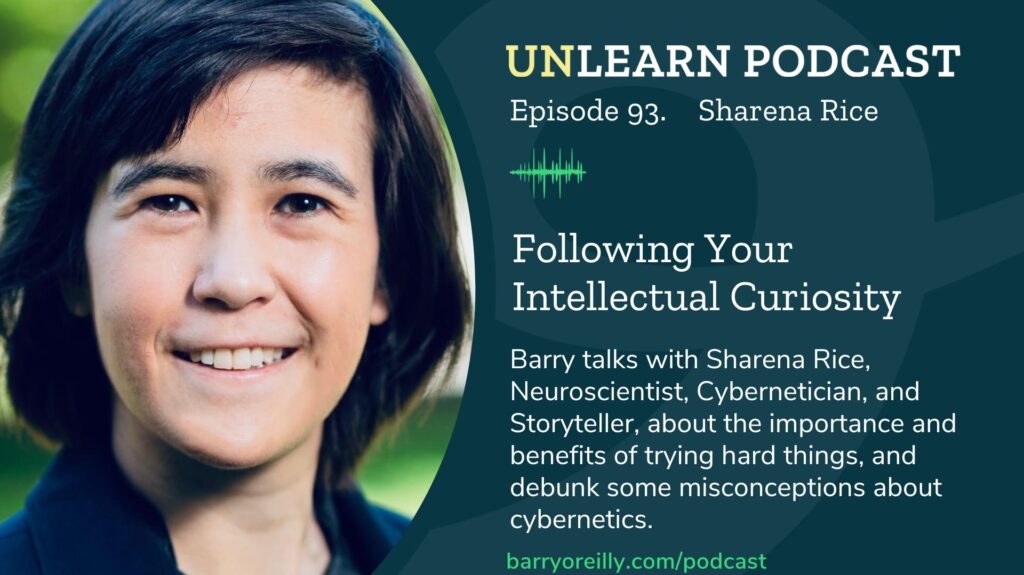Sharena Rice is a neuroscientist, cybernetician, and storyteller. As an advisor and consultant to startups, she works at the intersection of artificial intelligence and natural intelligence, and health and wellness. Her life’s goal is to take as much suffering in as she can in this lifetime and invert it. Focused on her health and wellness domain, Sharena helps Nobody Studios through her background knowledge of biomedicine and startup skills. In this episode of Unlearn, Sharena shares her experience as a systems neuroscientist and how it has helped her in life. She and Barry O’Reilly discuss the importance and benefits of trying hard things, following your intellectual curiosity, and debunking some misconceptions about cybernetics.
Getting Good at Failing
Doing hard things forces you to get out of your comfort zone. As a self-described former high school band geek, Sharena shares that music, especially jazz, teaches you a lot about experimentation and improvisation. In trying things that are initially hard, you put yourself in the position to be uncomfortable. By consistently doing this, you slowly get acclimated to practice and failing, which progressively grows your capabilities. It also has the added benefit of reducing your levels of self-consciousness. “Success and failure are just feedback mechanisms,” Sharena claims. They tell you if you’re going in the right direction or if you need course-correcting. “You have to keep attempting as you go through that process, rather than getting caught up in how successful you are, or how you failed.” [Listen from 4:15]

The Career Crossroads
Barry asks Sharena about her diverse career and how she got started. Sharena majored in biochemistry and double minored in philosophy and psychology in undergrad, but she didn’t feel as if she belonged in just one of those three boxes. There were elements of all fields that spoke to her, and she found herself conflicted on what path she should take. After linking them all together, she realized the common thread they all shared had something to do with the mind. Neuroscience was the perfect mix. She discovered, with the help of her advisor in grad school, that she was a systems neuroscientist. And from there, she found another passion in cybernetics. [Listen from 8:50]
Barry tells Sharena, “Sometimes society forces us onto this railroad path from such an early age; you must be on this highway with no on ramps or off ramps.” Entrepreneurial people, he finds, often reject that notion entirely. Their paths are dotted with twists and turns, where they go offroad and sometimes come back to it. They follow their intellectual curiosity, rather than the path set out for them. [Listen from 11:40]
Tech for Situational Understanding
Sharena debunks some misconceptions about what makes for good technology. Most people think of artificial intelligence and machine learning when they hear of cybernetic technologies – humanizing technology, to be specific. Rather than making technology human, it may be best to make technology that has great situational understanding so it can be great at solving the problems it encounters. [Listen from 13:25]
Barry shares, “When starting a program, from inception, you program values into the software whether implicitly or explicitly.” People have a rigidly binary view of this domain, when in reality, nothing is ever black and white when humans are in the loop. Humans are coding themselves into these pieces of software whether they’re aware of it or not. Therefore, situational understanding in technology isn’t a binary decision tree that goes one way or another. [Listen from 15:50]
Finding the Next Right Thing
Barry asks Sharena to disclose some tips for figuring out the next step. “[My] biggest thing is [my] orientation towards figuring out how to make the biggest positive impact in this lifetime,” she responds. “How do I take as much suffering as possible and invert it? That’s a different equation than if someone were to ask how they can help people in a certain domain.” Rather, it’s a big and overarching goal. [Listen from 23:25]
Questions Sharena asks herself include: If I were to do this at scale, what kinds of connections would I need to make that happen? What kinds of opportunities should I say yes to, and which kinds of opportunities are going to be a distraction in this process? Who should I be friends with? Who should I not pay as much attention to? [Listen from 24:20]
Looking Ahead
Sharena is currently working as a research scientist for a Public Benefit Corporation in medical technology. [Listen from 31:25]















